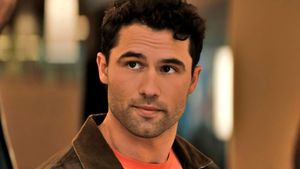The Presidential
Candidates By the Issues
The stands of
these 2008 presidential candidates on a selection of
issues: Democrats: New York senator Hillary Rodham Clinton,
former North Carolina senator John Edwards, Illinois
senator Barack Obama, and New Mexico governor Bill
Richardson. Republicans: Former New York mayor Rudy
Giuliani, former Arkansas governor Mike Huckabee, Arizona
senator John McCain, former Massachusetts governor
Mitt Romney, and former Tennessee senator Fred
Thompson.
<
ABORTION: Favor
abortion rights?
DEMOCRATS:
-Clinton:
Yes.
-Edwards:
Yes.
-Obama:
Yes.
-Richardson: Yes.
---
REPUBLICANS:
-Giuliani:
Yes.
-Huckabee:
No. Favors constitutional amendment banning abortion rights.
-McCain:
No. Says Roe v. Wade should be overturned.
-Romney:
No. Would let states decide. Opposes constitutional
amendment banning abortion. Previously supported
abortion rights.
Thompson: No.
Says Roe v. Wade should be overturned. Says states
should decide abortion policy, indicating he would not
support a constitutional abortion ban. Previously
stated support for right to early term abortion.
<
EDUCATION
DEMOCRATS:
-Clinton:
$10 billion for universal preschool. More money for special
education. Opposes performance-based merit pay for teachers,
favors incentives for teachers who work in places and
on subjects where shortages exist. Supported No Child
Left Behind accountability law but says it has not
been properly financed or run and should be replaced.
$10,000 higher education scholarships for all who engage in
national service full-time for a year. Raise value of
tuition tax credit to a maximum $3,500 from $1,650.
-Edwards:
Universal preschool for 4-year-olds. Change or replace No
Child Left Behind. On post-secondary education: ''Any
young person in America who's willing to work when
they're in college -- we pay for their tuition and
books at a state university or community college.''
-Obama:
Encourage but not require universal prekindergarten
programs, expand teacher mentoring programs and reward
teachers with higher pay not tied to standardized test
scores, in $18 billion plan to be paid for in part by
delaying elements of moon and Mars missions. Change No Child
Left Behind ''so that we're not just teaching to a
test and crowding out programs like art and music.''
Tax credit to pay up to $4,000 of college expenses for
students who perform 100 hours of community service a year.
-Richardson: Favors universal preschool and full-day
kindergarten. Hire 100,000 science and math teachers.
Scrap No Child Left Behind law. Favors starting salary
of $40,000 for teachers. Two years government-paid
tuition for one year of national service.
---
REPUBLICANS:
-Giuliani:
Favors vouchers for school choice.
-McCain:
Favors parental choice of schools, including vouchers for
private schools when approved by local officials, and right
of parents to choose home schooling.
-Huckabee:
States are responsible for education and should be given
more authority to run it, not Washington.
-Romney:
Supports federal requirements for standardized tests,
praises No Child Left Behind law, supports ''school
choice, better pay for better teachers, high
standards, scholarships for the best kids, English
immersion.''
-Thompson:
Favors incentives for school choice.
<
SAME-SEX
MARRIAGE: Support same-sex marriage?
DEMOCRATS support
recognition of same-sex civil unions short of marriage:
-Clinton:
Would let states decide whether to recognize same-sex
marriage. Opposes constitutional amendment against it.
-Edwards:
No. Opposes constitutional amendment against it.
-Obama:
Would let states decide. Opposes constitutional amendment
against it.
-Richardson: No, but has supported recognition of
same-sex civil unions.
---
REPUBLICANS:
-Giuliani:
No, but says he sees no need to amend Constitution to ban
it. Has supported domestic-partner benefits for gay
couples.
-Huckabee:
No. Amend Constitution to ban it.
-McCain:
Would let states regulate it. Opposes constitutional
amendment to ban it.
-Romney:
No. Amend Constitution to ban it. Also opposes same-sex
civil unions.
-Thompson:
No, but stops short of supporting a constitutional amendment
that would outlaw it. Favors federal action to protect
states that prohibit same-sex marriage from having to
honor a same-sex marriage allowed in another state.
<
GLOBAL WARMING
DEMOCRATS:
-Clinton:
Ten-year, $150 billion energy package, including $50 billion
''strategic energy fund'' to develop new sources of fuel.
Fund to be paid for by eliminating tax subsidies for
oil companies. Tougher fuel efficiency standards
financed in part by $20 billion in ''green vehicle
bonds.'' Voted for 2003 bill that would have capped 2010
emissions at 2000 levels. Would use some of the money
from auctioning pollution credits to cushion higher
consumer energy costs resulting from emission cuts.
-Edwards:
$13 billion-a-year energy fund to double Energy Department's
budget for efficiency and renewable energy, accelerate clean
energy technologies, encourage consumers to buy
efficient products and help workers move out of jobs
in polluting industries. Eliminate oil company
subsidies and establish cap-and-trade system requiring
companies to pay for emitting pollution. Supports
tougher vehicle fuel efficiency standards. Says people
must make sacrifices in energy use, including changing
vehicles they drive. As senator, missed vote on 2003 bill.
-Obama:
Ten-year, $150 billion program to produce ''climate
friendly'' energy supplies that he'd pay for with a
carbon auction requiring businesses to bid
competitively for the right to pollute. Joined McCain
in sponsoring legislation that would set mandatory caps on
greenhouse gas emissions and increase costs to
consumers. Supports tougher fuel efficiency standards.
Goal of cutting greenhouse pollution 20% by 2020.
-Richardson: Favors going ''well beyond''
requirements of the Kyoto treaty to curb greenhouse
gas emissions, boosting fuel economy standards and
undertaking massive spending on renewable energy to slash
oil imports from 65 percent of fossil fuel use to 10%
in 15 years.
---
REPUBLICANS:
-Giuliani:
Not sure how much global warming is caused by human
activity. ''I believe human beings are contributing to
it.'' ''I think the best way to deal with it is
through energy independence.'' Consider expanding
nuclear power as well as alternative energy.
-Huckabee:
Supports the move to 35 mpg fuel efficiency standard by
2020, from 25 mpg now. Says he supports a mandatory
cap and trade system for carbon emissions, while
saying he doesn't know how much of the global warming
problem is caused by human activity.
-McCain:
Chief cosponsor of a bill that sought mandatory caps on
greenhouse gas emissions. Plan would require emissions to
return to 2004 levels by 2012 and to 1990 levels by
2020.
-Romney:
As Massachusetts governor, backed out of regional pact to
curb carbon dioxide emissions from power plants
because it did not cap the higher energy costs it
might place on business and consumers. Says energy
independence is the way to deal with global warming.
-Thompson:
Has questioned whether global warming caused by manmade
activity is real. Cited research suggesting solar system is
warming.
<
GUN CONTROL
DEMOCRATS:
-Clinton:
Voted for ban on assault-type weapons and to require
background checks at gun shows. Favored leaving
gun-makers and dealers open to civil suits. Also, in
2000 supported proposals for a federal requirement for
state-issued photo gun licenses, as well as a national
registry for handgun sales.
-Edwards:
Voted as North Carolina senator for ban on assault-type
weapons and to require background checks at gun shows.
-Obama:
Voted to leave gun-makers and dealers open to suit. Also, as
Illinois state lawmaker, supported ban on all forms of
semiautomatic weapons and tighter state restrictions
generally on firearms.
-Richardson: Signed into law a bill allowing
residents to carry concealed handguns.
---
REPUBLICANS:
-Giuliani:
Now says states should decide appropriate gun controls. As
New York mayor and Senate prospect in 2000, favored
variety of federal controls, including ban on
assault-style weapons and waiting period for
purchases. Also favored a federal mandate to register
handgun owners and require handgun buyers to
''demonstrate good moral character and a reason to
have the gun.''
-Huckabee:
Supports state laws allowing people to carry concealed
weapons and a national ''right to carry'' law that
would require states to recognize concealed weapons
permits issued by other states.
-McCain:
Voted against ban on assault-type weapons, but in favor of
requiring background checks at gun shows. Voted to shield
gun-makers and dealers from civil suits.
-Romney:
As governor, supported state's strict gun control laws and
signed into law one of the nation's toughest laws against
assault-type weapons. Also supported regulatory
changes favored by gun owners and sellers, including
setting up appeals process for people denied gun
licenses. Previously supported federal ban on assault-type
weapons and federal waiting period for purchases.
-Thompson:
Hostile to many gun control proposals, including mandatory
background checks at gun shows. Supported campaign finance
changes that gun groups and other activists saw as an
infringement of their speech rights.
<
HEALTH INSURANCE
DEMOCRATS:
-Clinton:
Mandatory universal coverage in first term. Tax credits for
working families to make insurance more affordable --
ensuring premiums do not exceed a percentage of
income. Business would be required to offer insurance
to employees or pay into a pool for people without it.
Expand Medicare and federal employees' health
insurance plan to cover those without adequate
workplace insurance. Raise taxes on wealthier families
to help pay estimated cost of $110 billion a year. Also,
raise taxes on a portion of ''very generous'' plans
covering people making more than $250,000.
-Edwards:
Mandatory universal coverage in first term by expanding
system of federal health insurance and family tax
credits, and by imposing requirements on employers,
insurance companies and individuals. Increase taxes on
wealthier families to pay for program's cost of up to $120
billion a year.
-Obama:
Mandatory coverage for children. Aim for universal coverage
by requiring employers to share costs of insuring
workers and by offering coverage similar to that in
plan for federal employees. Says package would cost up
to $65 billion a year after unspecified savings from making
system more efficient. Raise taxes on wealthier families to
pay the cost.
-Richardson: Tax breaks for businesses and for people
who pay for their own coverage. Lower the eligibility
age for Medicare to 55 and expand programs for poor
and children. Package could cost up to $110 billion a
year. Claims savings from expanded spending on preventive
care would help achieve mandatory universal coverage
without tax increases.
---
REPUBLICANS:
-Giuliani:
Income tax deduction of $7,500 per taxpayer to defray
insurance costs. Tax credit for poorer workers to supplement
Medicaid and employer contributions as part of
''market-driven'' expansion of affordable coverage.
Expanded use of health savings accounts. No mandate
for universal coverage.
-Huckabee:
Favors market solutions, state innovation. ''We don't need
universal health care mandated by federal edict or funding
through ever-higher taxes.'' Spend more on prevention
and research.
-McCain:
$2,500 refundable tax credit for individuals, $5,000 for
families, to make health insurance more affordable. No
mandate for universal coverage. In gaining the tax
credit, workers could not deduct the portion of their
workplace health insurance paid by their employers.
-Romney:
Incentives for states to expand affordable coverage. As
governor, he signed health care law aimed at ensuring
universal coverage through a mix of subsidies,
sliding-scale premiums, and penalties for those who do
not get insurance.
-Thompson:
''Market-driven'' expansion of affordable coverage, but no
mandate.
<
IMMIGRATION:
Support legal status for illegal immigrants?
DEMOCRATS:
-Clinton:
Voted for 2006 bill that would have provided conditional
path to citizenship, and supported border fence.
-Edwards:
Supports path to citizenship for illegal immigrants who
speak English and meet other conditions.
-Obama:
Voted for the 2006 bill, including the fence.
-Richardson: Favors conditional path to citizenship
for illegal immigrants, opposes border fence. As
governor, signed law allowing illegal immigrants to
get licenses, saying it enhanced public safety.
---
REPUBLICANS:
-Giuliani:
Open to conferring legal status if proficiency in English
and payment of back taxes and penalties are among
conditions and if applicants in the legal system are
not disadavantaged. Urges use of tamper-proof ID cards
for immigrants. Says most of U.S.-Mexico border should
be policed with high-tech monitoring, supplemented by a
fence in some parts.
-Huckabee:
Has favored allowing illegal aliens who are in the country
to apply for legal status if they pay penalties, get
guest worker permits, register with authorities, and
aren't allowed to jump in line ahead of other
applicants. As governor, opposed banning state services for
illegal immigrants.
-McCain:
Sponsored 2006 bill that would have allowed illegal
immigrants to stay in the U.S., work and apply to
become legal residents after learning English, paying
fines and back taxes and clearing a background check.
Now says he would secure the border first. Supports border
fence.
-Romney:
Says he opposes McCain's immigration bill, although he
called it reasonable in 2005. Supports building a
border fence with Mexico and stationing National Guard
troops there. Calls for tamperproof ID card so only
legal immigrants can work. Opposes policy allowing legal
immigrants to host extended families in U.S.
-Thompson:
Opposed the conditional path to citizenship for illegal
immigrants laid out in legislation that President Bush
supported. Previously supported selective expansion of
legal immigration. Opposes policy allowing legal
immigrants to host extended families in U.S.
<
IRAQ
DEMOCRATS:
-Clinton:
Opposed troop increase, but has also opposed using
congressional spending power to end war. Has not committed
to withdrawal timetable and says some troops will have
to remain to continue fighting terrorism in Iraq and
the region.
-Edwards:
Immediate withdrawal of as many as 50,000 troops and full
withdrawal within 10 months. Would leave no combat troops in
Iraq, but small numbers nearby to engage terrorists.
-Obama:
''Our combat troops out within 16 months.''
-Richardson: ''All troops out within a year. No
residual forces.''
WAR
AUTHORIZATION: Democrats who were in the Senate when the war
was authorized -- Clinton and Edwards -- voted in
favor of the authorization and now say they would not
have voted that way in retrospect. Obama, who was not
in the Senate then, opposed war at the start.
---
REPUBLICANS:
-Giuliani:
Supported troop increase and prosecution of the war.
-Huckabee:
Now faults Bush for not sending enough troops to Iraq at the
start. Supported the 2007 troop increase and would not
withdraw forces any faster than recommended by
commanders.
-McCain:
Opposes scheduling a troop withdrawal, saying latest
strategy is succeeding. Supported decision to go to
war but was early critic of the manner in which
administration prosecuted it.
-Romney:
Supported troop increase and prosecution of the war.
-Thompson:
Supports Bush's course in Iraq and said in June he still
believed it was right to invade.
<
SOCIAL SECURITY
DEMOCRATS oppose
using a portion of payroll taxes to finance private
retirement accounts. In addition:
-Clinton:
Noncommittal on raising the $97,500 income cap on Social
Security. Proposes a federal match of up to $1,000 per
person to help people set up 401(k) plans in program
costing $25 billion a year, to be paid for by freezing
the estate tax at 2009 levels.
-Edwards:
Subject the portion of income over about $200,000 to Social
Security taxes, while keeping the portion of income between
$97,500 and $200,000 free of it.
-Obama:
Proposes raising cap with an unspecified ''small
adjustment'' that would subject a portion of higher
incomes to Social Security taxes.
-Richardson: Opposes raising the income cap for
Social Security taxes.
---
REPUBLICANS favor
using a portion of payroll taxes to finance private
retirement accounts. In addition:
-Giuliani:
''I would rule out a tax increase'' to save Social Security.
-McCain:
Would consider ''almost anything'' as part of a compromise
to save Social Security, yet rules out higher payroll
taxes for now.
-Huckabee:
Higher benefits for people who delay retirement past 70.
Give retirees option of declining their benefits, and
instead have Social Security issue a lump sum payment
at their death, with the money going to their children
or grandchildren.
-Romney:
Higher taxes are ''wrong way to go.''
-Thompson:
Only major candidate proposing lower-than-promised benefits
for future retirees. Also warns richest people ''we're not
going to take care of all your Medicare in the
future.''
<
STEM CELL
RESEARCH: Relax restrictions on federal financing of
embryonic stem cell research?
DEMOCRATS:
-Clinton:
Yes.
-Edwards:
Yes.
-Obama:
Yes.
-Richardson: Yes.
---
REPUBLICANS:
-Giuliani:
Yes.
-McCain:
Yes.
-Huckabee:
No
-Romney:
As governor, tried to stop legislation that encouraged
expanded embryonic stem cell research of the kind
opposed by President Bush. Veto was overturned.
-Thompson:
Says putting money into research using adult instead of
embryonic stem cells is ''the effective, ethical'' path.
<
TAXES
DEMOCRATS would
let some of Bush's tax cuts expire in 2010 as scheduled,
in effect raising taxes on wealthier people to help pay for
programs. Additionally:
-Clinton:
Tax proposals focused on universal health care plan,
including tax credits to make insurance more
affordable. Also, would tax a portion of health
insurance benefits provided to workers making more than
$250,000. Maintain estate tax on the richest tier. Increased
tax breaks for college. $1 billion paid family leave
program to be financed by eliminating some tax
shelters.
-Edwards:
For middle and low-income people, set up tax-free savings
accounts and have government match the first $500 in
savings, expand earned-income and child and dependent
care tax credits, and exempt the first $250 of
investment income from capital gains taxes. Tax cuts to
cost $25 billion a year. Raise rate on capital gains tax to
28 percent from 15 percent for those making over
$250,000.
-Obama:
About $80 billion in tax breaks mainly for low-income
workers and the elderly, including tax credit worth up
to $500 a person to offset payroll taxes and
elimination of tax-filing requirement for older workers
making under $50,000. A mortgage-interest credit could be
used by lower-income homeowners who do not take the
mortgage interest deduction because they do not
itemize their taxes. Raise corporate taxes and the top
rate on capital gains and dividends to pay for the cuts.
-Richardson: Has supported cuts in income and capital
gains taxes as governor.
---
REPUBLICANS would
generally extend Bush's tax cuts, which could cost $2.3
trillion to keep in place until 2017. Additionally:
-Giuliani:
Cut corporate tax rate to 25% from 35%, eliminate estate
tax. Hold the line on marginal tax rates or reduce
them, and establish a permanent child tax credit.
Index the alternative minimum tax to inflation. Income
tax deduction of $7,500 per taxpayer to defray health
insurance costs. Seek spending caps of 5% or more on
civilian agencies; slash bureaucracy by rehiring only
half the number of employees who retire.
-McCain:
Opposed some of Bush's tax cuts because they were not wedded
to spending cuts, but now says the tax cuts should be
made permanent. Eliminate alternative minimum tax.
-Huckabee:
Replace system of taxing income and investment with 23
percent national sales tax on goods and services,
cushioned for lower-income people and with rebates for
essential purchases.
-Romney:
Tax breaks to those earning less than $200,000, including
eliminating capital gains, interest and dividend taxes for
most. Estimated cost of $32 billion a year to be paid
in part by cutting growth of federal spending.
Eliminate estate tax.
-Thompson:
Let people choose between current system or one with flat
rate of 10% on first $50,000 of individual income or
$100,000 of joint income, and 25% on income above
those amounts. Exempt family of four from tax on first
$39,000 of income, and more than double standard deduction.
The simplified option would contain no other tax
credits or deductions, and would retain 15% tax rate
on capital gains. Also, end the estate tax and cut the
top corporate tax rate to no more than 27% from 35%.
<
TRADE
DEMOCRATS:
-Clinton:
Seek to reopen North American Free Trade Agreement to
strengthen enforcement of labor and environmental standards.
-Edwards:
Make human rights ''central to our trade policy.'' NAFTA and
other regional trade agreements have been a ''total
disaster.'' Supported bringing China into World Trade
Organization, says it's ''wrong to not hold them
responsible for their obligations.''
-Obama:
Seek to reopen NAFTA to strengthen enforcement of labor and
environmental standards.
-Richardson: Impose trade sanctions against countries
that violate human rights or don't hold free
elections, ''as we probably should consider doing with
China.''
---
REPUBLICANS:
-Giuliani:
Supports free trade, says NAFTA has been good for U.S.
-McCain:
Free trade advocate.
-Huckabee:
Blames China's currency manipulation and weak U.S.
regulatory enforcement for imbalance in trade and
imports of unsafe products, but has not said what he
would do.
-Romney:
Renegotiate liberalized trade with China to stop currency
manipulation that gives Chinese products unfair advantage.
-Thompson:
Supports free trade, says NAFTA has been good for U.S.
(Calvin Woodward, AP)




































































Charlie Kirk DID say stoning gay people was the 'perfect law' — and these other heinous quotes